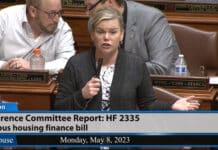ST. PAUL, Minn. – The Metropolitan Council recently released its 2018 update to the 2040 Transportation Policy Plan, assuring the plan aligns with Thrive MSP 2040.
The Metropolitan Council, an unelected group of policymakers created by the Minnesota Legislature in 1967, monitors all development in Anoka, Carver, Dakota, Hennepin, Ramsey, Scott, and Washington counties. The 2040 Transportation Policy was adopted by the Metropolitan Council in 2015, and the plan was updated this year.
Thrive MSP 2040 is the Metropolitan Council’s long-term plan for development in the seven-county area. It is the foundation of Metropolitan Council policy regarding transportation, land use, water use, wastewater, and housing and parks. Thrive MSP 2040 is also used to help guide local communities to adopt progressive values and policy.
Much of the recent update Transportation Policy Plan focuses on the development of high-density, multi-use housing around existing or planned public transportation hubs. Use of alternative modes of transportation like walking, bicycling, and taking public transit is also heavily encouraged.
The Metropolitan Council is changing the region’s focus from expanding the existing highway system to maintaining it and investing more in bicycle and pedestrian systems instead. To correspond, the plan states, local governments should plan for:
- A mix of housing choices, retail, and other commercial uses around station areas, known as transit-oriented development.
- Communities designed for biking and walking, where residents can choose to use their car less (or not at all) to go shopping, get to a transit stop or station, get to work and school, and recreation areas.
- Building housing and commercial developments that are denser to create more successful and efficient transit service areas, including providing more transit service.
- Providing a mix of housing choices, including affordable options near transit to accommodate youth, the elderly, and populations looking for an alternative to driving.
The Transportation Policy Plan lasts from 2015 through 2040. The Metropolitan Council estimates that $92 billion will be available as transportation funding in the metro area over the 25-year period.
Of the $92 billion, 48% is from local taxes and fares, 38% is from state taxes and fees, and 14% is from federal sources. 45% of these funds are designated to be used for local transportation, 38% is to be used for transit and 17% are for highways.
The Metropolitan Council maintains that the current funding is inadequate and is a “major issue” that the metro area faces.

















